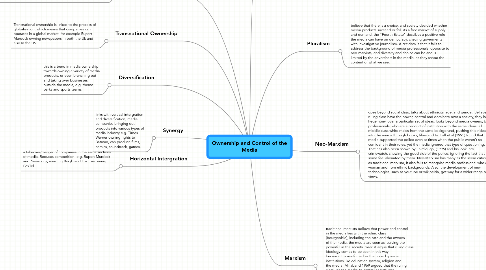Ownership and Control of the Media
by Nikki Alliu

1. vertical intergration
1.1. vertical integration means that instead of taking over other media companies, you will take over and own the stages of production, for example if you were to own a newspaper company, vertical integration would be owning the trees that make the paper for your news paper. By doing this you will increase your control and cut cost when developing your product.
2. Horizontal Intergration
2.1. a takeover/merger of companies in the same sections of media. Reduces competition. e.g. Rupert Murdock and Newscorp, merging Bskyb and Fox, becoming FoxTel.
3. Transnational Ownership
3.1. Transnational ownership is linked to the process of globalisation, which means that companies can operates in a global market. for example Rupert Murdock owning newspapers in both the Uk and also In the US.
4. Diversification
4.1. this is a trend in media ownership towards owning a variety of media products, or even branching out and taking over businesses outside the media, e.g. theme parks and sports teams.
5. Synergy
5.1. links with vertical intergration and diversification, media companies bringing out products into various types of media industry e.g. Times Warner owning rights to Batman, can produce films, comics, soundtrack, games.
6. Concentration
6.1. media being owned by a smaller organisation, ownership in fewer hands, buying up smaller companies e.g. Rupert Murdock owning the Times, The Sun (in the UK) New York Post (in America)
7. Marxism
7.1. traditional marxists believe that power and control in the media lies with the ruling class (bourgeoisie), including the sate and the owners of the media. the media are seen as serving the powerful in the society. marxist argue that ruling-class ideology comes to be seen in this way because it is reinforced as the norm by social institutions like education system, religion and the media. Millaband 1969 argued that the ruling class use the media to control society and creating a false reality. the "opium of the people " he saw the media as replacing religion. a key criticism would be an overly conspiratorial view of the role of owners.
8. Pluralism
8.1. believe that there is a choice, and society decided whether media products succeed or fail. its a free market of supply and demand. the "Fourth Estate" descibes a positive role the media can have on democracy, checing goverments with investigative journalism. A criticism is that it fails to address the background of media professionals, opposite to neo-marxists, and diversity and choice can be and is limited by the advertisers in the media, as they shape the content of what we see.
9. Neo-Marxism
9.1. goes beyond social class, talks about ethnicity, age, and gender. Believes ruling class have the power, control and dominate over a society, they have hegemony, over a particular set of ideas. looks beyond media owners, but professionals, who are a product of institution with the same ideas, all middle class white males from the same backgorund, pushing thie rideals into the meida through books, films and tv. Hall et al (1995) found that media supported the police even at times when the public weren't so confident in their roles, yet the media ignored that type of questioning. That has also been shown by Fairclough, (1995) and his look into crimewatch, showing the good side of the police, ignoring the fact that some feel alienated by them. Neo-Marxism has many as the seem criticisms as traditional marxism, it also fails to recognise media professional who are woman and from ethnic backgrounds. Also, the development of new technologies, such as youtube or wikipeida, get way for a wider range of views.


